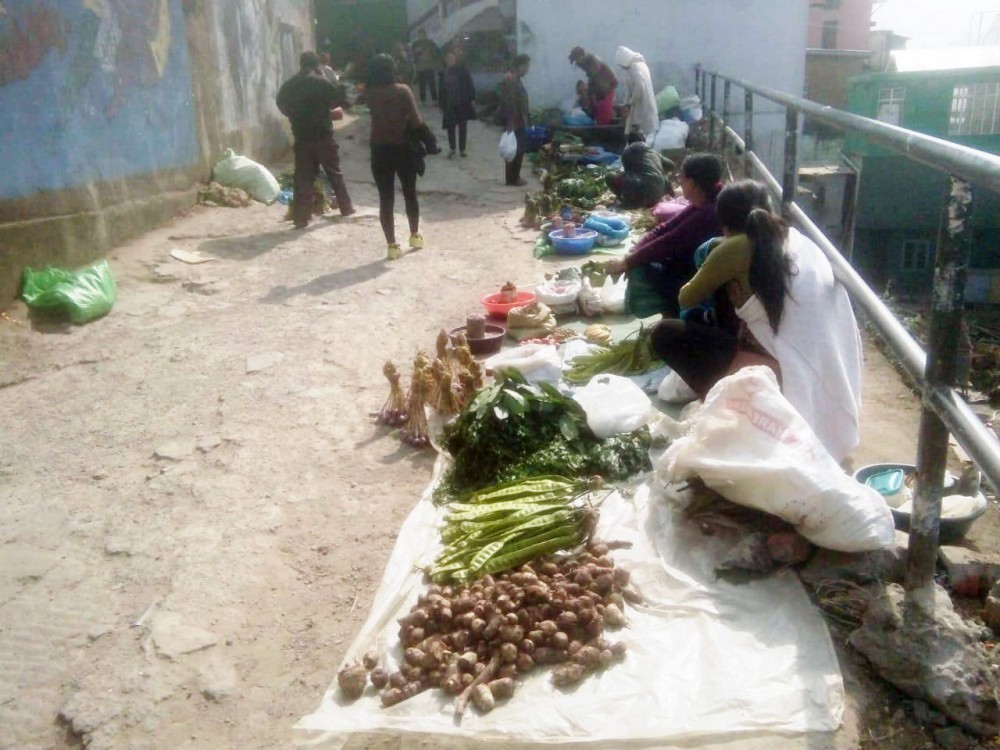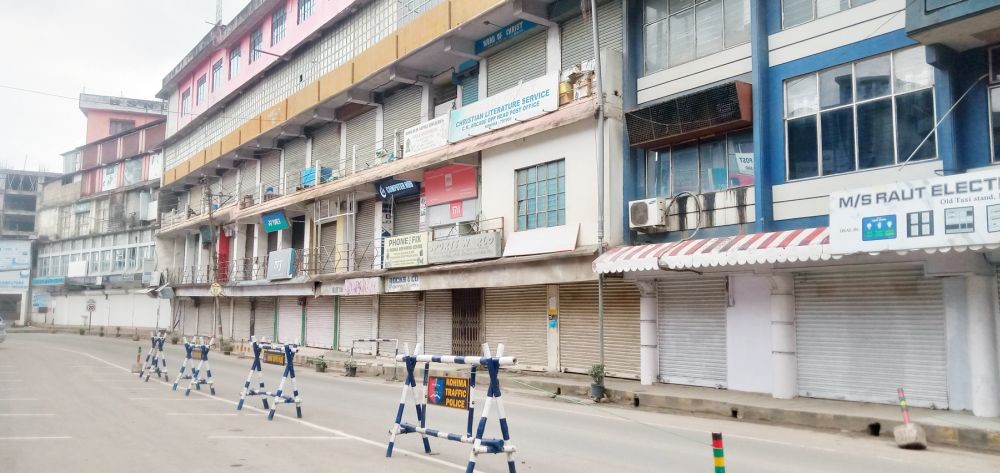Naga women street vendors face a difficult life with no support to carry on their work under better conditions. The Entrepreneurs Associates is helping them adopt a savings culture apart from pushing the Nagaland State Government to promulgate the Street Vendors Act 2014. (Morung Photo)

• 99.9% women street vendors in Nagaland do not have any savings
• EA contributes Rs. 2000 to women vendors saving Rs. 10,000
• Street Vendors Act 2014 yet to be enacted in Nagaland
Chizokho Vero
Kohima | February 19
Women street vendors in Nagaland have started adopting a savings culture through the efforts of Entrepreneurs Associates (EA).
Reaching out to women street vendors across Nagaland State through a project titled ‘Uplifting women street vendors,’ the EA has been empowering women street vendors and encouraging them to adopt a savings culture to gain financial stability.
“I have started saving Rs. 100 daily,” said a street vendor, Kane Tholi, during a workshop held here today at Red Cross Conference Hall. She encouraged others to do the same.
She thanked EA for propagating the advantages of savings and also assisting women street vendors in many ways.
Another street vendor, Vekhohulü Tetseo, also praised EA for coming forward to help the women street vendors, thereby benefiting many.
Neikule Doulo of EA said that 99.9% women street vendors do not have any savings. She expressed delight that with the intervention of EA, savings culture among women street vendors has gone up by 22%.
Once the savings of any of the women street vendors reaches Rs. 10,000, EA contributes Rs. 2000 as bonus, said EA’s CEO and coordinator Neichute Doulo.
Doulo also informed that the door is open for any woman street vendors who wants to avail loan from EA for other business ventures.
He, however, said that one has to be honest and abide by the mode of repayment.
Doulo regretted that Street Vendors Act 2014 is yet to be enacted in Nagaland. Street Vendors (Protection of Livelihood and Regulation of Street Vending) Act, 2014 is an Act of the Parliament of India enacted to regulate street vendors in public areas and protect their rights.
He noted that it is high time the Nagaland State Government promulgated the Act. He assured the street vendors that the EA will discuss protection and facilities for them with the State Government.
Jinisha Sharma and Neeta Joshi from Capri Global Ltd Mumbai also exhorted the street vendors and extended solidarity for their welfare and protection.
Uplifting Women Street Vendors
In a pioneering initiative to support women vendors of the State for better access to rights and educate them on basic skills in business health and finance, EA initiated the ‘Uplifting Women Street Vendors’ movement in 2017.
The project seeks to ensure that the training benefits the most deserving women who can in turn educate their peers and keep the change in motion.
The project’s first cycle was piloted in Kohima and has spread to Mokokchung, Pfutsero, Phek and Dimapur and has touched 1000 vendors in all.
According to the EA concept note, traditionally Naga women have been engaged in farming activities and working alongside men folk in the interest of their families. The story continues to be the same till today.
The rapid increase in the cost of living has led to the ostensible increase in the number of women, many of whom are uneducated to step out of their homes to take up livelihood activities, in the urban centres like Kohima, Dimapur and also in other district headquarters.
At first, many of these women concentrated on selling their own farm produce but slowly the business has become more organised with some of them dealing entirely in retailing produce sourced from different villages. Today, many of the women have diversified to deal in fruits, grains, and vegetables – both wild and cultivated.
All over Nagaland, especially in urban centres, people come across women vendors on the side of roads, in towns, in market sheds and in narrow lanes as they sell their products. They start the day at the crack of dawn and are there late into the evening hoping to make a sale.
Concerns
The Street Vendors Act 2014 is yet to be enacted in Nagaland.
Women vendors sit by the sidewalks of almost every town in Nagaland and are regularly subjected to harassment that includes human and natural factors. They are compelled to remain in their ‘spots’ whether rain, sun or wind.
Many of these women have to constantly relocate due to reasons related to administrative directives as well as being refused space by private landowners. Many of them confess that they do not want to sell their products at the designated spots owing to lack of sale over long periods. There is no provision by the local or municipal authorities to ensure their safety or basic amenities let alone their “comfort” in the spots that they claim.
The absence of public toilets subjects women vendors to complex health threats. Complaints abound about urinary infections and/or kidney infections due to the practice of abstaining from drinking water so that they can refrain from using the toilets, as such facilities are almost absent.
There is also lack of know-how of business among this section of vendors. It is a common observation that even after so many years, many of the women vendors have not climbed up the economic ladder. A lot of them are unaware about how to plan financially for their future besides stock management, bookkeeping.
In Nagaland, Naga women are holding the fort in terms of retailing local yields and they are doing so without support or help from any area of society.
Objectives of the project
EA proposes to conduct workshops with women street vendors involved in roadside vending in phases over a period of 6 months to a year.
The project aims to capacitate women street vendors in Nagaland, give them basic business skills and understanding on how the market works, to positively impact the business habits of women street vendors through sessions on customer services and ethical business to ensure vibrant long term business, facilitate financial empowerment through savings, stock, and finance management, create awareness on product knowledge, sensitize the women on health and hygiene related topics, to educate women street vendors about their basic legal rights and make them model entrepreneurs to influence their families.




